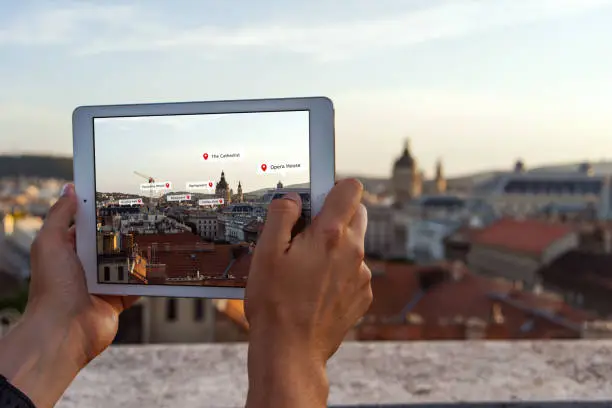
The Transformative Impact of Technology on Travel
The synergy between technology and travel has redefined how we explore the world, streamlining every aspect of the journey. From booking flights to navigating foreign cities, digital advancements ensure that modern travelers experience unprecedented convenience and efficiency. As technology continues to evolve, so too does the landscape of global travel.
Below, we delve into the dynamic relationship between technology and travel, illustrating its profound impact across the industry.
Smart Booking Systems: Simplifying the Journey
Online travel agencies (OTAs), mobile apps, and AI-driven platforms have revolutionized how travelers plan their trips. In 2023 alone, approximately 68% of travel bookings were made online, showcasing the shift from traditional agencies to digital solutions. Tools like Expedia, Booking.com, and Google Flights offer tailored options based on user preferences, utilizing advanced algorithms to recommend the best deals.
Furthermore, artificial intelligence (AI) enhances the booking experience by predicting price trends and offering real-time suggestions. For instance, platforms like Hopper analyze billions of flight and hotel prices daily, helping travelers save money while maximizing value.
The Rise of eSIM Technology for Seamless Connectivity
Maintaining connectivity abroad has historically been a challenge for globetrotters. However, eSIM technology has transformed this aspect of travel. Unlike traditional SIM cards, eSIMs allow users to switch between carriers without needing physical hardware.
According to GSMA, over 500 million eSIM-enabled devices were in circulation by 2024, a number expected to double by 2026. This innovation provides travelers with immediate access to local networks, ensuring affordable roaming solutions and uninterrupted communication. For frequent travelers, services like Airhub offer global eSIM packages that cover over 200 countries, eliminating the hassle of purchasing individual SIM cards at each destination.
Immersive Experiences with Virtual Reality (VR) and Augmented Reality (AR)
Virtual and augmented reality technologies have elevated travel experiences to unprecedented heights. VR enables users to explore destinations virtually before visiting, offering a glimpse into iconic landmarks, hotels, and attractions. Companies like Expedia and Airbnb use VR to provide 360-degree virtual tours of properties, empowering travelers to make informed decisions.
Meanwhile, AR enhances on-the-ground experiences. Apps like Google Lens and Citymapper overlay real-time information onto physical spaces, providing interactive maps, translations, and historical context. In a study by Research and Markets, the global AR tourism market is projected to reach $9.5 billion by 2030, driven by the increasing adoption of AR-enabled smartphones and wearables.
Contactless Travel: Redefining Safety and Convenience
Post-pandemic, the demand for contactless solutions has surged across the travel industry. Airports, hotels, and restaurants have embraced technologies like QR codes, biometric check-ins, and contactless payments to ensure a safer and more efficient experience.
For example, Dubai International Airport uses biometric recognition systems to streamline passenger processing, reducing wait times by up to 40%. Similarly, hotel chains like Marriott and Hilton offer app-based check-ins, keyless room entry, and in-app service requests, catering to tech-savvy travelers.
The Role of AI-Powered Travel Assistants
AI-powered travel assistants, such as chatbots and virtual concierge services, have become indispensable tools for modern travelers. These systems, often integrated with messaging platforms like WhatsApp or standalone apps, provide 24/7 support for tasks ranging from itinerary adjustments to local restaurant recommendations.
For instance, Amadeus’ AI-driven chatbot assists users with personalized flight and accommodation suggestions based on travel history and preferences. According to a Skift report, over 40% of travelers rely on AI tools at some point during their trip, underscoring their growing importance.
Sustainable Travel Technology: A Greener Future
With sustainability emerging as a top priority, technology is playing a pivotal role in fostering eco-friendly travel. Carbon footprint calculators, electric vehicle (EV) rentals, and smart energy management in hotels are just a few examples.
Apps like Ecosia Travel and Skyscanner allow users to offset their carbon emissions directly during booking, while services like Lime and Bird promote eco-conscious urban exploration through electric scooters. According to the International Air Transport Association (IATA), the aviation industry alone is investing heavily in sustainable fuels and AI-powered route optimization to reduce emissions by up to 15% per flight.
Wearable Tech: Enhancing Traveler Experiences
Wearable devices, such as smartwatches and fitness trackers, offer a myriad of benefits for travelers. These gadgets not only monitor health metrics but also provide navigation, language translation, and instant notifications.
For example, Garmin’s travel-focused wearables feature offline GPS maps and emergency alert systems, making them indispensable for adventure seekers. As of 2024, the wearable tech market is valued at $115 billion, with travel-specific applications driving significant growth.
Big Data and Personalization in Travel
Big data analytics empowers companies to deliver hyper-personalized experiences by analyzing user behavior, preferences, and past activities. Airlines use big data to predict passenger demand and optimize flight schedules, while hotels leverage it to offer custom packages tailored to individual needs.
For example, Hilton Honors integrates user data from its loyalty program to suggest unique itineraries and exclusive perks, enhancing guest satisfaction. Meanwhile, platforms like TripIt compile travel information into a centralized app, streamlining planning for users on the go.
Challenges and Opportunities Ahead
While the integration of technology and travel offers immense benefits, it also presents challenges. Data privacy concerns, cybersecurity threats, and the digital divide between tech-savvy and underserved regions require continuous attention.
However, the opportunities outweigh the obstacles. Emerging innovations like blockchain-based travel solutions and AI-driven language tools promise to make global exploration more secure, accessible, and efficient.
Conclusion
The intersection of technology and travel represents a paradigm shift that continues to redefine how we experience the world. From AI-driven personalization to sustainable innovations, technological advancements are shaping the future of travel in ways once thought unimaginable. By embracing these tools, we unlock a world of possibilities, making every journey more enriching, efficient, and enjoyable.











